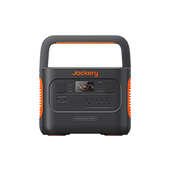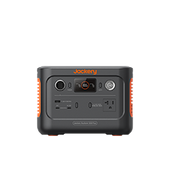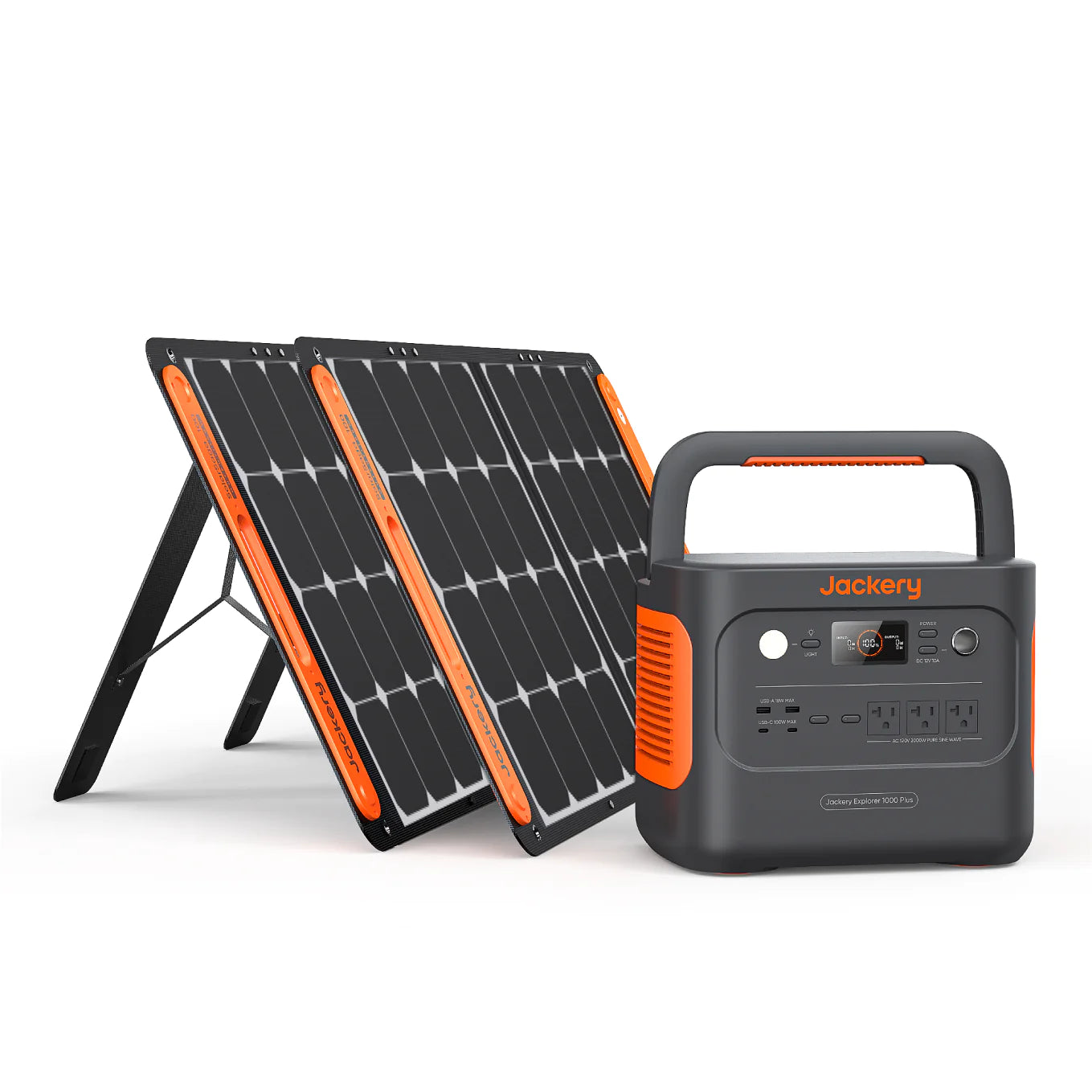Refrigerators are one of the essential home appliances and it can be a major hassle to charge them during a power outage. That's where the best solar generator for refrigerators comes into the picture. However, before you plan to invest in the charging solution, you need to understand what size generator is needed to run a refrigerator and freezer.
Jackery Solar Generators are available in different sizes to keep essential appliances like refrigerators and freezers charged during power outages or outdoor adventures. They are powerful, portable, and lightweight charging solutions to charge various other appliances, such as mini freezers, air coolers, electric grills, etc., whenever required.
How Many Watts Does A Refrigerator Use?
As there are different variants of refrigerators available on the market, the wattage required to run a fridge varies considerably. For example, a small refrigerator, mini solar cooler, or compact freezer uses fewer watts, whereas a large refrigerator needs more power.
Read on to find out how much solar energy you need to run a refrigerator, the starting and running watts, and the different refrigerator types available on the market.
What Is Watt?
Watt (or W) is a unit of power used to quantify the energy transfer rate for a moment at a time. On the other hand, watt-hour (Wh) measures energy for a specific period. For instance, energy spent in one hour is termed a watt-hour.
For instance, if a solar generator has a capacity of 200 watts, the watt-hour will be around 240 Wh. Meanwhile, a larger solar power generator of 1000 watts Pro will have a watt-hour of 1002 Wh.
How Many Starting & Running Watts Refrigerator Use?
Large appliances like freezers and refrigerators have electric motors present in them. That's why they need more starting watts than running watts. Starting watt is the amount of energy required to start an appliance; meanwhile, the running watt is the power any device needs to run for hours.
The actual wattage consumption of a refrigerator or fridge will significantly depend on energy class, size, temperature difference, etc. Older larger units generally require 700-1000 running watts, while the starting watts are high (up to 2000-3000 watts). Meanwhile, newer units consume less energy and power.
Generally, starting watts are always four times greater than running watts. Here is the simple formula to calculate starting watts.
Starting watts = 4 * Running watts
Let us assume that a refrigerator consumes 300 running watts. Here is how you can calculate the starting watts:
Starting watts = 4 * 300W = 1200W.
Here, 1200 watts are the minimum power you need to charge your solar refrigerator for hours. That said, you'll need to purchase a specific solar power generator that can provide more than 1200W power.
Pro Tip: Before buying the best solar-powered generator for a refrigerator, it's vital to check the battery capacity, brand, and manufacturer. There are different solar power generators available in the market. Also, check the power station's features and ensure they have a robust protection system to keep the large appliance like refrigerator safe.

How Much Energy is Needed To Run A Refrigerator?
One of the common questions homeowners ask while buying solar generators is: how much solar power do I need to run a refrigerator. The short answer lies in the type of refrigerator you have.
For instance, if you have a large refrigerator that consumes around 800W, you'll have to purchase a solar generator with a high capacity. A solar power generator that can provide 800Wh (watt-hour) or more would be suitable for powering large refrigerators.
Meanwhile, if you want to charge a mini cooler for camping or other outdoor activities, consider purchasing a solar generator with a capacity of 1000 watts. With a 1000 W solar generator, you can power different appliances with clean and green energy.
Here are a few different types of refrigerators with their starting and running watts.
- Large home refrigerators require 200-400 running watts and 800-1600 starting watts. This refrigerator is usually present in homes and businesses.
- Average home refrigerators require 100-250 running watts and 500-1000 starting watts.
- Small home refrigerators require 75-150 running watts, whereas starting watts are 400-600. An average solar power generator can keep your small power generator charged for long hours.
- Mini coolers or fridges require 50-100 running watts and 200-400 starting watts. The portable refrigerator and solar generator combo will help keep your food cool and healthy.
- Compact home or RV refrigerators require only 40-50 running watts, with starting watts around 80-120. These refrigerators are portable and perfect for camping and outdoor activities.
Another question that solar generator buyers ask is: how many solar panels to run a refrigerator or freezer? The answer to this depends on your requirements and the wattage your electrical appliance consumes per hour.
On average, the refrigerator takes around one to four solar panels to run. However, it will directly depend on the panel's solar generation capacity and the refrigerator's size. You can choose the number of solar panels depending on the power generator size and the estimated daily energy consumption.
Here is the breakdown of how many watts different refrigerator types consume or the energy that runs a refrigerator. Understanding the power consumption of a refrigerator will help you determine how many watt generators are needed to run a refrigerator.
|
Refrigerator Types |
Estimated Watt |
Length of Time Powered each day |
Estimated daily energy consumption (Watt-hours) |
Estimated monthly energy consumption (Watt-hours) |
Estimated yearly energy consumption (Watt-hours) |
|
Mini Cooler |
50-100 Watt |
8H |
400-800 Wh |
12000-24000 Wh |
144000-288000 Wh |
|
Single Door Large Refrigerator |
100-200 Watt |
5H |
500-1000 Wh |
15000-30000 Wh |
180000-360000 Wh |
|
Double Door Large Refrigerator |
350-780 Watt |
3H |
1050-2340 Wh |
31500-70200 Wh |
378000-842400 Wh |
|
Single Door Small Refrigerator |
75-150 Watt |
6 H |
450-900 Wh |
13500-27000 Wh |
162000 -324000 Wh |
|
Double Door Small Refrigerator |
200-350 Watt |
4 H |
800-1400 Wh |
24000-42000 Wh |
288000-504000 Wh |
|
Triple Door Refrigerator |
300-600 Watt |
8 H |
2400-4800 Wh |
72000-144000 Wh |
864000-1728000 Wh |
|
Compact Refrigerator |
40-50 Watt |
6 H |
240-300 Wh |
7200-9000 Wh |
86400-10800 Wh |
Best Solar Generators For Refrigerator
Jackery is a leading solar brand manufacturing solar generators, portable power stations, and solar panels. The Jackery Portable Power Stations can be recharged with the Jackery SolarSaga Solar Panels, wall outlets, and a car charger. Jackery can power refrigerators and freezers of different sizes and capacities.
The Jackery Solar Generators are available in various capacities. Depending on the running and starting watts of refrigerators, you can choose the right size of solar generator. For example, you can choose a small solar generator if you want to charge a small freezer. On the other hand, a large solar generator would be ideal for extended power outages.
Jackery Solar Generator 3000 Pro
The Jackery Solar Generator 3000 Pro is a large-capacity charging solution that supports 99% of household or outdoor appliances for long hours. If you live in an area that faces unexpected long-term power outages, you may consider this powerful solar generator for refrigerators. It can charge small, midsize, and large refrigerators for long hours, ensuring your food does not get spoiled. It also features pull rods, double wheels, and a foldable handle to charge appliances on the go.
Appliances Running Time
- Compact Refrigerator (50W) = 51.4H
- Car Fridge (60W) = 42.8H
- Mini Fridge (100W) = 25.7H
- Small Home Refrigerator (150W) = 17.1H
- Large Home Refrigerator (400W) = 6.4H

Jackery Solar Generator 2000 Plus
If you want a solar generator that works during power outages and can also be carried to outdoor adventures, then the Jackery Solar Generator 2000 Plus would be an ideal choice. It can charge different types of refrigerators to ensure your food does not get spoiled during unexpected power cuts. You can also charge 99% of other home or outdoor appliances, such as ice makers, coolers, etc. It also features double wheels and a foldable handle for easily carrying the generator anywhere.
Appliances Running Time
- Compact Refrigerator (50W) = 34.7H
- Car Fridge (60W) = 28.9H
- Mini Fridge (100W) = 17.3H
- Small Home Refrigerator (150W) = 11.5H
- Large Home Refrigerator (400W) = 4.3H

Jackery Solar Generator 1000 Plus
The Jackery Solar Generator 1000 Plus works great if you're planning outdoor adventures such as RV or camping trips. It can easily charge refrigerators of different sizes for long hours. It supports 99% of devices to keep you prepared for power outages or outdoor adventures. If you want more power, it can be expanded from 1.2kWh to 5kWh with the help of Jackery Battery Pack 1000 Plus.
Appliances Running Time
- Compact Refrigerator (50W) = 21.4H
- Car Fridge (60W) = 17.9H
- Mini Fridge (100W) = 10.7H
- Small Home Refrigerator (150W) = 7.1H
- Large Home Refrigerator (400W) = 2.6H

One of the most vital features of Jackery Portable Power Stations is pass-through charging. That being said, you can recharge and power appliances at the same time. With this, you'll never run out of power in any condition if you have a Jackery Portable Power Station with you.
What Size Of Generator to Run Refrigerator and Freezer?
A generator that can deliver at least 2000-2500 watt of electricity is sufficient to charge a refrigerator and freezer at the same time. However, the actual size of the solar generator to power the refrigerator will depend on multiple factors, including the refrigerator's age, features, size, temperature, amount of time it remains open, and more.
Here is the simple mathematical formula to calculate what size solar generator to run the refrigerator and freezer.
Let us assume that you are using a Solar Generator 1000 Plus that has a capacity of 1264 Wh.
Working time = 1264 Wh * 0.8/ operating wattage of your device.
For instance, suppose your refrigerator consumes 200 watts of power. (You can find the power consumption of the freezer in the user manual).
Then you can calculate the working time by substituting the value in the formula.
Working time = 1264 Wh * 0.8/ 200W = 5 hours.
However, this does not mean you can power your appliance for this calculation hours. Due to the pass-through feature, you can even keep it plugged in for charging and power appliances simultaneously.
Note: This is a rough calculation to determine the power consumption and working hours. If you're unsure which Jackery model will suit your needs, feel free to consult Jackery experts.

Conclusion
If you're planning to use clean and renewable energy for your home, a solar generator for the refrigerator is all you need. Besides the solar fridge, you can power other appliances, including a coffee maker, mini cooler, electric grills, and electric blanket, to name a few.
Purchasing a solar generator for refrigerator is all you need to go solar and cut connections from your electricity grid.
Instead of purchasing a solar-powered refrigerator, you can buy a solar generator to charge your traditional freezer. Jackery Solar Generator 1000 Plus, Jackery Solar Generator 2000 Plus, and Jackery Solar Generator 3000 Pro are the three most popular solar generators to power all your home appliances at home or during camping.
They are portable solutions that help you charge your appliances while away from home. If you want more exciting news about Jackery products, subscribe to our newsletter and get every information about deals and offers in your inbox.
FAQs About Solar Generator For Refrigerator
1. Can a 100-watt solar panel run a refrigerator?
A single 100-watt solar panel can efficiently run several small devices, including phones, laptops, fans, lamps, etc. However, you'll need to purchase a solar power station to pair with the panels and charge appliances like refrigerators, CPAP and so on.
2. How many solar panels to run a refrigerator?
The expected number of solar panels to run a refrigerator will depend on several factors, including:
- The power rating of the solar panels
- The capacity of the solar power generator
- Amount of peak sunlight hours you receive
- Energy consumption or wattage requirements of your refrigerator
A 200-watt solar panel is an excellent choice as you can collect and store enough energy to keep your appliance running for hours.
Remember, solar panels won't work independently, and you must connect them to portable solar power generators. The right combination will help you power all your appliances, including the refrigerator, and prevent the items from degradation.
3. How long will a solar generator power a refrigerator?
There are different sizes and models of solar generators available on the market. Two best Jackery solar generators that can power your refrigerator for hours include Jackery solar power 2000 Plus and 5000 Plus.
- Jackery Solar Generator 2000 Plus can keep your large refrigerator (520W) running for nearly 3 hours. Meanwhile, you can keep your mini cooler (60W) charged for 23 hours.
- Jackery Solar Generator 5000 Plus can power a household refrigerator for up to 110 hours.
If you intend to enjoy camping or other outdoor activities, purchase Jackery Solar Generator 1000 Plus to power all your devices. Meanwhile, people who want a backup solution for power outages or off-grid living can choose Jackery Solar Generator 2000 Plus or 5000 Plus.
4. Can you run a refrigerator on a solar generator?
The short answer is yes. You can efficiently run a small or large-sized refrigerator on a solar generator. However, you should consider a few things while buying a solar generator model.
- Calculate the wattage that your refrigerator consumes.
- Consider the estimated number of hours you might need a solar generator to power your appliance.
Pro Tip: Always purchase a power generator that renders more wattage than your refrigerator needs. You can find the wattage requirements of your fridge written on the user manual or on the sidewalls of the appliance.
5. Will a 2000-watt generator run a refrigerator?
Yes, a 2000-watt generator delivers at least 2000 starting watts and will be sufficient to run both the refrigerator (400W) and the freezer (200W) for hours without any issues.






















































































































Leave a comment